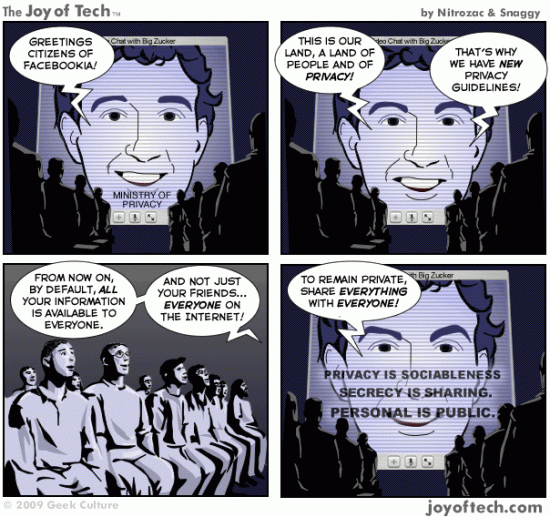Facebook’s Gone Rogue; It’s Time for an Open Alternative
Source: wired.com

Facebook has gone rogue, drunk on founder Mark Zuckerberg’s dreams of world domination. It’s time the rest of the web ecosystem recognizes this and works to replace it with something open and distributed.
Facebook used to be a place to share photos and thoughts with friends and family and maybe play a few stupid games that let you pretend you were a mafia don or a homesteader. It became a very useful way to connect with your friends, long-lost friends and family members. Even if you didn’t really want to keep up with them.
Soon everybody — including your uncle Louie and that guy you hated from your last job — had a profile.
And Facebook realized it owned the network.
Then Facebook decided to turn “your” profile page into your identity online — figuring, rightly, that there’s money and power in being the place where people define themselves. But to do that, the folks at Facebook had to make sure that the information you give it was public.
So in December, with the help of newly hired Beltway privacy experts, it reneged on its privacy promises and made much of your profile information public by default. That includes the city that you live in, your name, your photo, the names of your friends and the causes you’ve signed onto.
This spring Facebook took that even further. All the items you list as things you like must become public and linked to public profile pages. If you don’t want them linked and made public, then you don’t get them — though Facebook nicely hangs onto them in its database in order to let advertisers target you.
This includes your music preferences, employment information, reading preferences, schools, etc. All the things that make up your profile. They all must be public — and linked to public pages for each of those bits of info — or you don’t get them at all. That’s hardly a choice, and the whole system is maddeningly complex.
Simultaneously, the company began shipping your profile information off pre-emptively to Yelp, Pandora and Microsoft — so that if you show up there while already logged into Facebook, the sites can “personalize” your experience when you show up. You can try to opt out after the fact, but you’ll need a master’s in Facebook bureaucracy to stop it permanently.
Care to write a status update to your friends? Facebook sets the default for those messages to be published to the entire internet through direct funnels to the net’s top search engines. You can use a dropdown field to restrict your publishing, but it’s seemingly too hard for Facebook to actually remember that’s what you do. (Google Buzz, for all the criticism it has taken, remembers your setting from your last post and uses that as the new default.)
Now, say you you write a public update, saying, “My boss had a crazy great idea for a new product!” Now, you might not know it, but there is a Facebook page for “My Crazy Boss” and because your post had all the right words, your post now shows up on that page. Include the words “FBI” or “CIA,” and you show up on the FBI or CIA page.
Then there’s the new Facebook “Like” button littering the internet. It’s a great idea, in theory — but it’s completely tied to your Facebook account, and you have no control over how it is used. (No, you can’t like something and not have it be totally public.)
Then there’s Facebook’s campaign against outside services. There was the Web 2.0 suicide machine that let you delete your profile by giving it your password. Facebook shut it down.
Another company has an application that will collect all your updates from services around the web into a central portal — including from Facebook — after you give the site your password to log in to Facebook. Facebook is suing the company and alleging it is breaking criminal law by not complying with its terms of service.
No wonder 14 privacy groups filed a unfair-trade complaint with the FTC against Facebook on Wednesday.
Mathew Ingram at GigaOm wrote a post entitled “The Relationship Between Facebook and Privacy: It’s Really Complicated.”
No, that’s just wrong. The relationship is simple: Facebook thinks that your notions of privacy — meaning your ability to control information about yourself — are just plain old-fashioned. Head honcho Zuckerberg told a live audience in January that Facebook is simply responding to changes in privacy mores, not changing them — a convenient, but frankly untrue, statement.
In Facebook’s view, everything (save perhaps your e-mail address) should be public. Funny too about that e-mail address, for Facebook would prefer you to use its e-mail–like system that censors the messages sent between users.
Ingram goes onto say, “And perhaps Facebook doesn’t make it as clear as it could what is involved, or how to fine-tune its privacy controls — but at the same time, some of the onus for doing these things has to fall to users.”
What? How can it fall to users when most of the choices don’t’ actually exist? I’d like to make my friend list private. Cannot.
I’d like to have my profile visible only to my friends, not my boss. Cannot.
I’d like to support an anti-abortion group without my mother or the world knowing. Cannot.
Setting up a decent system for controlling your privacy on a web service shouldn’t be hard. And if multiple blogs are writing posts explaining how to use your privacy system, you can take that as a sign you aren’t treating your users with respect, It means you are coercing them into choices they don’t want using design principles. That’s creepy.
Facebook could start with a very simple page of choices: I’m a private person, I like sharing some things, I like living my life in public. Each of those would have different settings for the myriad of choices, and all of those users could then later dive into the control panel to tweak their choices. That would be respectful design - but Facebook isn’t about respect — it’s about re-configuring the world’s notion of what’s public and private.
So what that you might be a teenager and don’t get that college-admissions offices will use your e-mail address to find possibly embarrassing information about you. Just because Facebook got to be the world’s platform for identity by promising you privacy and then later ripping it out from under you, that’s your problem. At least, according to the bevy of privacy hired guns the company brought in at high salaries to provide cover for its shenanigans.
Clearly Facebook has taught us some lessons. We want easier ways to share photos, links and short updates with friends, family, co-workers and even, sometimes, the world.
But that doesn’t mean the company has earned the right to own and define our identities.
It’s time for the best of the tech community to find a way to let people control what and how they’d like to share. Facebook’s basic functions can be turned into protocols, and a whole set of interoperating software and services can flourish.
Think of being able to buy your own domain name and use simple software such as Posterous to build a profile page in the style of your liking. You’d get to control what unknown people get to see, while the people you befriend see a different, more intimate page. They could be using a free service that’s ad-supported, which could be offered by Yahoo, Google, Microsoft, a bevy of startups or web-hosting services like Dreamhost.
“Like” buttons around the web could be configured to do exactly what you want them to — add them to a protected profile or get added to a wish list on your site or broadcast by your micro-blogging service of choice. You’d be able to control your presentation of self — and as in the real world, compartmentalize your life.
People who just don’t want to leave Facebook could play along as well — so long as Facebook doesn’t continue creepy data practices like turning your info over to third parties, just because one of your contacts takes the “Which Gilligan Island character are you?” quiz? (Yes, that currently happens)
Now, it might not be likely that a loose confederation of software companies and engineers can turn Facebook’s core services into shared protocols, nor would it be easy for that loose coupling of various online services to compete with Facebook, given that it has 500 million users. Many of them may be fine having Facebook redefine their cultural norms, or just be too busy or lazy to leave.
But in the internet I’d like to live in, we’d have that option, instead of being left with the choice of letting Facebook use us, or being left out of the conversation altogether.
Article from: Wired.com
Image: JoyofTech.com






















